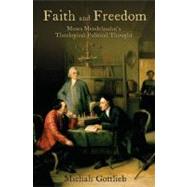Faith and Freedom Moses Mendelssohn's Theological-Political Thought
, by Gottlieb, Michah- ISBN: 9780195398946 | 0195398947
- Cover: Hardcover
- Copyright: 3/2/2011
Two major interpretations of Mendelssohn's achievements have attained prominence in recent works. One interpretation, defended most recently by David Sorkin and Edward Breuer, casts Mendelssohn as a Jewish traditionalist who uses the language of enlightened German philosophy to bolster his pre-modern religious beliefs. The other interpretation, defended by Allan Arkush, casts Mendelssohn as a radical Deist who defends Judaism exoterically in order to avoid arousing opposition from his co-religionists while facilitating their social integration into enlightened European society. In Faith and Freedom, Michah Gottlieb stakes out a middle position. He argues that Mendelssohn defends pre-modern Jewish religious concepts sincerely, but in so doing, unconsciously gives them a humanistic valence appropriate to life in a diverse, enlightened society. Gottlieb sees the Pantheism Controversy as part of a broader assessment of Mendelssohn's theological-political philosophy, framed in terms of Mendelssohn's relation to his two greatest Jewish philosophical predecessors, Moses Maimonides (1138-1204) and Baruch Spinoza (1632-1677). While Mendelssohn's relation to Maimonides and Spinoza has been discussed sporadically, Faith and Freedom is the first book-length treatment of this subject. The connection is particularly instructive as both Maimonides and Spinoza wrote major theological-political treatises and exercised profound influences on Mendelssohn. Not surprisingly, Mendelssohn is deeply ambivalent about both of these figures. He reveres Maimonides for what he sees as his synthesis of Judaism with secular knowledge, while seeming deeply disturbed by Maimonides's elitism, his equivocation regarding many of the tenets of theism, his espousing religious coercion, and his intolerant view of Gentiles. As for Spinoza, Mendelssohn respects him as a model for how a Jew can fruitfully contribute to science and philosophy and be a model of ethical rectitude. But Mendelssohn objects to Spinoza's atheism, advocacy of state religion, debunking of Jewish chosenness, and rejection of Jewish law. For Mendelssohn, reason best preserves human dignity and freedom by upholding the individual's right to arrive at truth on their own and determine their own beliefs independently of all authority. As such, reason demands that the state respect diversity of thought and religious expression. Mendelssohn interprets faith in the Jewish sense as trust in God's providential goodness, arguing that reason affirms this as well. But he recognizes the difficulty of establishing metaphysical truth rationally and so in his final works adumbrates a form of religious pragmatism. The faith-reason debate rages again today. Gottlieb explores Mendelssohn's theological-political thought with an eye to axiological and political dimensions of the debate.






